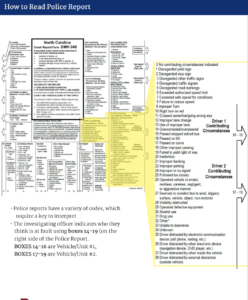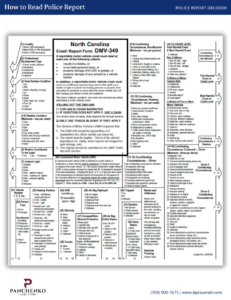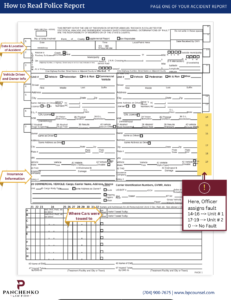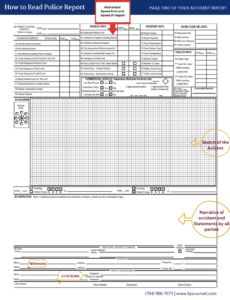Understanding the Importance of How to Read a NC Police Report
A North Carolina police accident report is more than just paperwork—it serves as an official record of an accident and can be crucial in determining fault, assessing property damage, and supporting insurance settlements or claims. Whether you are dealing with a car accident, a personal injury case, or simply need documentation for your insurance company, knowing how to read a NC police report ensures you can accurately interpret the details that matter. Additionally, learning how to read a NC police report can help you identify inconsistencies or missing information that may affect your claim.
This report includes critical information such as the accident scene, vehicles involved, driver information, and the responding officer’s determination of the incident. Additionally, it may list the police report incident number, any citations issued, and an overview of special circumstances that contributed to the crash.
Since insurance companies and personal injury attorneys rely heavily on these reports when negotiating claims and settlements, it’s essential to review the document carefully for accuracy. Any errors in the report number, driver’s license information, insurance details, or estimated speed can impact your case. If you find discrepancies, you may need to contact the police department or seek assistance from an experienced car accident attorney to request corrections.
Understanding your North Carolina accident report is the first step in protecting your rights and ensuring fair compensation. In the next sections, we’ll guide you through the process of obtaining, decoding, and correcting your crash report to strengthen your personal injury claim.
Why Your Police Report Matters in a Personal Injury Case
In the aftermath of an accident, a North Carolina car accident report is a crucial document that provides the first official account of the incident. Learning how to read a NC police report is essential, as it includes details such as the date, time, location, vehicles involved, driver information, and any eyewitness accounts—all of which can significantly influence the outcome of your personal injury case.
The Role of a Police Report in Determining Fault
Having access to this information is vital. Knowing how to read a NC police report allows you to examine key details that establish the circumstances surrounding the accident, including the actions of the parties involved. This clarity is essential when determining liability, as insurance companies and courts heavily rely on the report to assess fault and damages.
Moreover, the report may contain the responding officer’s determination regarding the cause of the accident. This assessment can play a pivotal role in your case, affecting how claims are processed and settlements are negotiated. If there are discrepancies in the report, they can impact your ability to recover compensation. Therefore, understanding the nuances of how to read a NC police report is imperative for anyone involved in a personal injury case.
In summary, the police report is not just a formality; it is a foundational document that can shape the direction of your claim. Taking the time to review and comprehend this report can empower you as you navigate the complexities of your personal injury case.
Obtaining Your North Carolina Accident Report
Accessing your North Carolina crash reports is a crucial step following an accident. However, obtaining the report is only the first step—understanding how to read a NC police report is just as important. This document holds essential information that can significantly influence your personal injury case. Here’s how you can obtain your NC accident report efficiently.
How to Access Your NC Police Report
To get your police report, start by visiting the appropriate police department’s website or office where the accident was reported. Police officers are responsible for generating these official reports, which serve as crucial documentation of incidents, crimes, or accidents. You can often request the report online, via mail, or in person. If you choose to go online, look for the section regarding accident reports. You may need to provide details such as the report number, date of the accident, and the names of the parties involved.
If you prefer to visit in person, bring identification and any relevant information about the incident. This will help the officers locate your report more quickly. Some departments may charge a small fee for obtaining a copy of the report, so be prepared for that possibility.
What You Need to Know About the DMV-349 Form
In North Carolina, the DMV-349 form is commonly used for reporting accidents. This form is crucial because it captures vital details about the crash. It includes information on the vehicles involved, the parties present, and the circumstances surrounding the incident. Additionally, it documents drivers’ insurance information, which is essential for identifying if drivers are insured and understanding the extent of their coverage.
If your accident resulted in injuries or significant property damage, the police officer on the scene would typically complete this form. You can request a copy of the DMV-349 form from the police department as part of your accident report. Understanding this form is essential, as it provides a comprehensive overview of the incident and can help clarify the facts in your case.
By following these steps, you can obtain your North Carolina accident report and ensure you have the necessary documentation to support your personal injury claim.
Decoding Your North Carolina Police Report
Figuring out how to read a NC police report can seem overwhelming at first, but it is crucial for your personal injury case. This section will guide you through the key elements of the report, ensuring you can interpret the most important details that may impact your claim.
Identifying the NC Police Report Incident Number
Every NC police report comes with a unique incident number. This number is vital as it allows you to reference the specific report when communicating with your attorney or the police department. Make sure to note this number, as it facilitates easier access to your report and any related documents.
Analyzing Basic Crash Information
The report includes essential details about the accident. Look for the date, time, and exact location of the incident. This information sets the context for your case. Additionally, pay attention to the weather conditions and road conditions at the time the accident happened, as these factors can influence fault determination. Law enforcement officers document their observations and conclusions regarding the circumstances of the accident, including factors such as speeding or traffic signal violations.
Reviewing Vehicle and Driver Details
Next, examine the information regarding the vehicles involved. This includes the Vehicle Identification Number (VIN), license plate numbers, and insurance details. Also, review driver information such as names, addresses, and driver’s license information. This data is crucial for establishing liability and understanding the parties involved in the accident.
Understanding the Fault Analysis
When reviewing how to read a NC police report, one of the most critical sections to analyze is the responding officer’s determination of fault. This section is significant because it can influence your personal injury claim. If the officer identifies one party as at fault, it can strengthen your case when seeking compensation from the insurance company.
Charges and Citations: What They Mean for Your Case
Lastly, take note of any charges or citations issued as a result of the accident. These can include traffic violations or criminal charges against one of the drivers. Understanding these citations can provide insight into the circumstances surrounding the accident and may affect your case’s outcome.
By understanding how to read a NC police report, you can gather essential information that will aid in your personal injury claim. If you encounter any confusion or need assistance, don’t hesitate to reach out to a qualified personal injury attorney. They can help you interpret the report and guide you through the next steps in your case.
Common Mistakes to Look for in Your Police Report
As you learn how to read a NC police report, it’s essential to be vigilant for potential mistakes. Errors in the report can have significant implications for your personal injury claim. Any inaccuracies may lead to misunderstandings about the accident, potentially affecting how the insurance company evaluates your case.
Here are some common mistakes to watch for:
- Incorrect Incident Details: Ensure that the date, time, and location of the accident are accurate. Any discrepancies can raise questions about the reliability of the report.
- Inaccurate Vehicle Information: Check that the vehicle identification numbers (VIN), license plate numbers, and descriptions of the vehicles involved are correct. Errors here can complicate insurance claims.
- Driver Information: Verify that the names, contact details, and driver’s license information for all parties involved are correctly listed. Mistakes can lead to delays in processing your claim.
- Fault Determination: Look closely at how the responding officer assessed fault. If the report inaccurately reflects the circumstances of the crash or misattributes blame, it could hinder your case.
- Witness Statements: If witnesses were present, ensure their statements are accurately captured. Missing or misquoted witness accounts can weaken your position.
- Charges and Citations: Review any charges or citations issued. If the report inaccurately states the violations, it could misrepresent the severity of the incident.
- Skid Marks and Damage Assessment: Check that the report includes accurate descriptions of skid marks and property damage. This information is crucial for reconstructing the accident.
How Errors Can Impact Your Personal Injury Claim
Errors in your NC police report, often documented by responding officers, can impact your personal injury claim significantly. If you find any mistakes, it’s important to take action promptly. You can contact the police department that issued the report to request corrections. Having an accurate police report is vital for building a strong case and securing fair compensation.
Why Choose Panchenko Law Firm to Help You Read Your NC Police Report
When you are involved in a car accident, understanding the NC police report is crucial. At Panchenko Law Firm, we specialize in guiding you through this process. Our experienced car accident attorneys know that a well-interpreted police report can significantly impact your personal injury case.
Our Client-Centered Approach to Personal Injury Law
We focus on providing a client-centered approach. This means we prioritize your needs and concerns from the moment you contact us. Our team is dedicated to ensuring you have a clear understanding of every detail within your North Carolina accident report. We take the time to explain how each section of the report can affect your claim.
Multilingual Support for a Diverse Clientele
Additionally, we offer multilingual support. Our staff speaks Russian, Ukrainian, Spanish, and Vietnamese, allowing us to communicate effectively with clients from diverse backgrounds. This ensures that language barriers do not hinder your understanding of the NC police report.
No Fees Unless We Win: Our Commitment to You
Finally, our commitment to you is straightforward: no fees unless we win. We believe in fighting for your rights without adding financial stress. You can trust that we will work diligently to maximize your compensation. Choose Panchenko Law Firm to help you navigate the complexities of your NC police report with confidence.
Contact Panchenko Law Firm Today
If you need assistance on how to read a NC police report, don’t hesitate to reach out to us. At Panchenko Law Firm, we are dedicated to helping you understand every detail of your report and how it relates to your personal injury case.
Schedule Your Free Consultation with Our Experienced Car Accident Attorneys
Our team of experienced car accident attorneys is ready to provide you with the guidance you need. We offer a free consultation where we can discuss your situation and outline the next steps. Whether you have questions about the report itself or need help with the claims process, we are here to assist you.
Contact us today to schedule your consultation. You can call us directly or fill out our online form.
Let us help you take the first step toward securing the compensation you deserve (704) 900-7675









